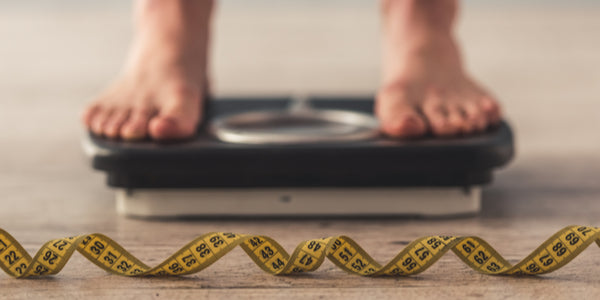
Another article talking about weight? Indeed, and this article will fully elucidate how and why the scale can shift so seemingly rapidly within a day.
Instead of worrying about pesky pound changes, understand how fat, water and muscle weight affect the number on the scale and the difference between fat loss versus weight loss.
The Difference Between Fat Versus Muscle
Weight can be a tricky concept to dissect, hence the reason people still say that muscle weighs more than fat. In reality, one pound of muscle weighs the exact same as one pound of fat. They both “weigh” a pound! However, muscle is more dense than fat, which exerts differences in physique and appearance.
Think of it this way: whereas weight is the mass or heaviness of an object, density refers to how much space an object assumes. Meaning, two objects can weigh the exact same but take up vastly different amounts of space. For example, a pound of steel consumes much less space than a pound of feathers. Steel is monumentally more dense than feathers!
A more practical example, a pound of fat is bulky, feathery and around the size of a small melon. A pound of muscle is solid, compact and around the size of a small tangerine. Thus, two people who weigh the same but have different body compositions (i.e. one has more fat and one has more muscle) can look completely different and endure or not endure different health problems.
In general, a higher body fat percentage appears as a soft, less toned physique whereas a higher percentage of muscle appears as a firm, toned physique.
Furthermore, a higher percentage of fat is correlated with poor health outcomes but higher percentages of muscle mass tend to boost metabolism so one burns more calories at rest. This is important because someone with a poor muscle-to-fat ratio exhibiting a low weight is at higher risk for obesity-related complications and conditions than someone with a higher body weight but a better muscle-to-fat ratio. This perfectly transitions into the BMI conundrum.
How Does BMI Relate to Weight?
Body mass index (BMI) is determined by dividing a person’s weight (in kilograms) by the square of height (in meters) and is considered a measure of body size. However, it’s often criticized as an inaccurate portrayal because it doesn’t account for specificity of tissue, meaning it doesn’t distinguish between fat and muscle mass.
To revisit the example from above, this means that two people who are the same height and weigh the same but have different tissue composition may be deemed at equal risk for chronic conditions. However, the person with more muscle mass has much less risk in reality. Unfortunately, at a doctor’s office, they may still be vilified as needing to lose “weight”.
How Do These Concepts Affect the Scale?
Many people know the all too disheartening feeling of stepping on the scale after beginning a new fitness regimen and seeing a higher number than baseline. How can this happen one might think through frustration and boiling tears.
Well, to reiterate, muscle and fat technically weigh the same. Thus, if someone loses a pound of fat but gains two pounds of muscle, weight will rise on the scale.
However, before the last 10 years or so, the scale could not differentiate between fat and muscle mass. This has left many people feeling defeated when they actually made tremendous progress. It’s important to recognize that body composition or the differentiation between skeletal tissue is a much better predictor of overall health than the weight reflected on a scale.
Moreover, weight aside, one should be able to visually see a difference in appearance because muscle consumes less space and appears smaller and more sculpted than fat. Nowadays, there are scales that can differentiate between fat and muscle mass, although they can have a large margin of error and thus, should be used with caution.
The most accurate ways to measure the difference in tissue is to get a DEXA scan or utilize a bioelectrical impedance analysis (BIA). The former is the gold standard and the latter is much more accessible and cost effective.
In summary, before fretting about an increasing scale weight, consider the differences between fat versus muscle tissue plus the following points.
What Is Water Weight?
Interestingly, body water accounts for the largest percentage of body weight despite many people thinking fat takes that trophy. Indeed, up to 60 percent of a human’s body is water, which can account for 45 to 65 percent of someone’s overall weight.
H2O is present in nearly every single cell but is majorly influenced by age, sex and, drumroll please, muscle mass. Generally speaking, males contain more water than females, and the percentage of water weight decreases as one ages. Furthermore, because water comprises nearly 80% of muscles, someone with more lean (muscle) body weight will carry more water than someone with less muscle and more fat.
In terms of water weight vs fat vs muscle, the two latter tissues change rather slowly whereas water weight can fluctuate by the hour! Thus, when someone sees a five pound difference on the scale from morning to midday, it’s likely due to water fluctuations, not fat or muscle gain. So what influences these rapid water weight changes?
How Water Weight Changes
Water residence can be divided into two basic groups: extracellular water (ECW) and intracellular water (ICW).
ECW is located outside of the cells and helps control the transport of electrolytes, oxygen delivery and clearing of metabolic waste. Thus, water in this area is affected by factors like sodium, alcohol and inflammatory food consumption and respiratory sickness. ECW can change rapidly and often accounts for sudden scale weight fluctuations.
On the other hand, ICW is located within cells and is responsible for many cellular processes. The most important one being osmosis or the diffusion of water across the cell membrane and into the different organelles (parts) of a cell. Although ICW can affect scale weight, it does less so than ECW. So, no need to worry about the amount of water muscle retains.
However, more important than considering each one separately, the ratio of ICW to ECW accounts for the most weight changes. A 3:2 ratio of ICW to ECW indicates a healthy fluid distribution. When this falls out of balance, it signals changes in body composition and health.
When ICW increases, it can indicate an increase in muscle mass and therefore a positive change in body composition. This occurs because when muscles enlarge, they require and take in more ICW to fuel their cellular function.
Conversely, when ECW increases in relation to ICW, this can indicate health risks like inflammation, poor toxin removal, or unhealthy fat mass levels. Such factors can then affect other health markers such as blood pressure and heart, kidney, and lung function. Increases in ECW tend to be related to injury, illness and poor lifestyle habits like eating a highly refined sugar and high sodium diet, inactivity, excessive alcohol consumption, smoking and, although very rare, hyponatremia.
In short, healthy lifestyle habits like eating a noninflammatory diet, exercising regularly, maintaining a healthy weight and drinking enough hydrating fluid keep water weight fluctuations at bay. Unhealthy lifestyle practices, on the other hand, cause it to change and sometimes quite rapidly.
Other Causes of Scale Fluctuation
Still, other factors beyond fat versus muscle versus water weight can cause the scale to fluctuate. Some of these include:
Inconsistent Weigh-In Times
The scale tends to show the lowest number upon waking and increases throughout the day. Weight yourself at the same time each day or on designated days to track the most accurate progress.
Wearing Different Attire
Clothes and accessories can have a surprising effect on that scale number reflection. Wear similar attire, remove unordinary accessories and take off shoes before stepping on the scale.
Bowel Movements
Stagnant waste (aka poop) can also be a culprit of unexpected weight gain. For this reason, follow tip #1 and always weigh yourself before or (better yet) after having a bowel movement.
Menstrual Cycles
Closely related to water weight fluctuations, “that time of the month” can cause scale fluctuations because of water retention. Honestly, just avoid stepping on the scale during this time because it’s not an accurate representation and cause even more hormonal havoc than necessary.
Eating a Heavy Meal
Again related to water weight retention, eating a heavy meal, which usually includes plenty of sodium, sugar, and fat, promotes holding onto more water. The body shuttles ICW into the extracellular space to help flush out toxins and waste, which results in a higher scale number for a time period.
The Takeaway
A pound is a pound is a pound. A pound of muscle, fat and water all weigh the same, but consume different amounts of space. This highly influences body composition, or how one looks on the outside, and makes interpreting scale fluctuations a headache. Thus, fat loss with simultaneous muscle gain could actually reflect a rising number on the scale while at the same time indicate improved health.
Similarly, water weight is subject to change based on different lifestyle habits and times of the day or month. And still, other factors like clothing attire and bowel movements can also affect the number on the scale.
Perhaps the scale is one of the least accurate measures of health or progress and certainly not worth the amount of stress it can induce. Instead, gauge weight loss and gain on more accurate measures like how clothes fit, a tape measure, physique appearance and if possible, body composition analyses.
References:
Body Water: Percentage and Ratios You Should Know. InBody USA. Published September 19, 2019. inbodyusa.com/blogs/inbodyblog/40668865-your-body-and-you-a-guide-to-body-water/.
Muscle Density vs Fat: How It Affects Your Weight. Tanita. Published August 6, 2020. tanita.eu/blog/muscle-density-vs-fat/.
O'Keefe Osborn C. Does Muscle Weigh More Than Fat? The Truth About Body Composition. Healthline. Updated July 8, 2020. www.healthline.com/health/does-muscle-weigh-more-than-fat.







